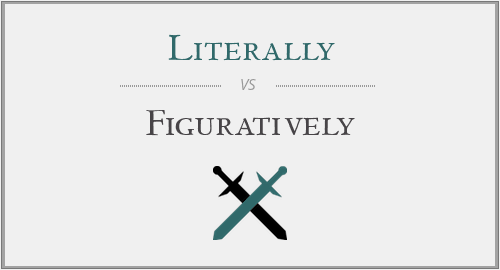They are both adverbs and both used in literary contexts, and this might be one of the reasons why "literally" and "figuratively" are often confused. But it's important that you clearly identify the sense of each word, because their meanings are completely different. In fact, the main reason why you should have a clear distinction of their meanings is that they are antonyms.
Find out what "literally" and "figuratively" mean so that you won't be tricked again by the usual confusion between them.
Literally vs. Figuratively
Both "literally" and "figuratively" are commonly used adverbs especially in literature, but also in daily conversations. Both words originate from adjectives ("literal" and "figurative") and they are both used to describe how real something is, but there is a major difference between them: their meaning.
"Literally" and "figuratively" are antonyms. One refers to a fact that actually happened for real, confirming and supporting the veracity of something, while the other is a synonym for "metaphorically", confirming and supporting the figurate, imaginative sense of a fact.
When do we use "literally"?
There are several contexts where you can use "literally" in daily conversations, but you should keep in mind its meaning so that you use it correctly. "Literally" is an adverb describing the real, original meaning of a word, expression of phrase, or the credibility of a fact. In addition, "literally" is often used informally to emphasize what you are saying, as in the second example provided below.
Example 1: Literally hundreds of people die every day because of your war. - "literally" is used as an adverb describing the real meaning of "hundreds of people".
Example 2: Her words literally killed me. - "literally" is used in this case to emphasize with the intensity of the effect of some words.
When do we use "figuratively"?
"Figuratively" is also an adverb, but it describes the imaginative, metaphorical meaning of a phrase which derives or is deducted from its original, usual one.
Example: Figuratively speaking, she died of anger when she heard the news of her defeat. - referring to an imaginative meaning of an expression, deducted from its usual sense.
Conclusion
"Literally" and "figuratively" are two usual words in English and, on top of this, they are antonyms. Make sure you don't confuse them so your message is always got right.
"Literally" is used to describe the real, original meaning of an expression, whereas "figuratively" is used for the opposite, for the metaphoric sense.





Have a discussion about this article with the community:
Report Comment
We're doing our best to make sure our content is useful, accurate and safe.
If by any chance you spot an inappropriate comment while navigating through our website please use this form to let us know, and we'll take care of it shortly.
Attachment
You need to be logged in to favorite.
Log In